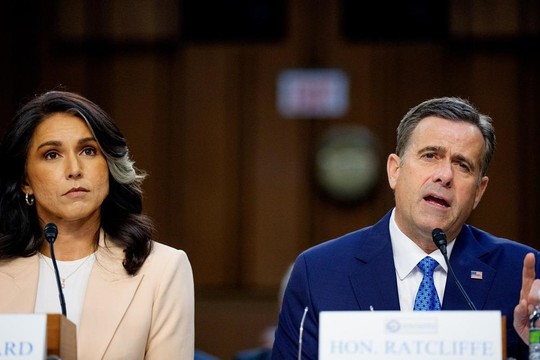Director of National Intelligence Tulsi Gabbard (left) and CIA Director John Ratcliffe present ‘The 2025 Annual Threat Assessment’ at the Congress.
Photo: AP
An annual U.S. intelligence assessment of global threats also questions both countries’ willingness to reach a quick settlement to the war, writes POLITICO.
U.S. intelligence agencies sounded the alarm on Ukraine’s dwindling battlefield prospects against Russia in an annual report released Tuesday.
The 2025 Annual Threat Assessment of the U.S. Intelligence Community — released by the Office of the Director of National Intelligence in conjunction with top officials’ testimony at a Senate Intelligence Committee hearing — warns that Moscow has “seized the upper hand” in the war over the past year and “is on a path to accrue greater leverage” to force favorable terms in its negotiations with Ukraine and the West.
Intelligence agencies see continued Russian military resilience despite heavy battlefield losses — replenishing personnel and ratcheting up its industrial capacity.
“Russia retains momentum as a grinding war of attrition plays to Russia’s military advantages,” the report states. “This grinding war of attrition will lead to a gradual but steady erosion of Kyiv’s position on the battlefield, regardless of any U.S. or allied attempts to impose new and greater costs on Moscow.”
The analysis comes as President Donald Trump presses for a pact to end the war after he campaigned on negotiating a settlement between Russia and Ukraine within the first 24 hours of his presidency. U.S.-Ukraine ties, however, are the most turbulent they’ve been since Russia invaded Ukraine in 2022. Trump’s push also has Ukraine’s advocates in the U.S. and Europe concerned that a potential deal may be on terms that are too favorable to Russia.
However, the assessment casts doubt on Russia or Ukraine’s desire for a deal. Putin and Zelenskyy are “interested in continuing discussions” to end the war, the report concludes, but both leaders “probably still see the risks of a longer war as less than those of an unsatisfying settlement.”
“Regardless of how and when the war in Ukraine ends, Russia’s current geopolitical, economic, military, and domestic political trends underscore its resilience and enduring potential threat to U.S. power, presence, and global interests,” the intelligence report argues.
The intelligence community report also prominently addresses threats posed by drug cartels, listing them first, in addition to terrorist groups and other transnational criminal groups.
Senate Intelligence Chair Tom Cotton said it’s the first time the report highlights illicit drug groups before other major threats. The move reflects the Trump administration’s focus on border security and cracking down on undocumented immigration.
In her opening remarks at the Senate worldwide threats hearing, Director of National Intelligence Tulsi Gabbard said non-state criminal groups and terrorists are “what most immediately and directly threatens the United States and the well-being of the American people.”
Beijing represents “the most comprehensive and robust military threat” to the U.S., the report adds in its assessment.
Intelligence agencies argue China will likely ratchet up coercive actions against Taiwan, and the report predicts “steady but uneven” progress by China in developing the military capabilities needed to invade the self-governing island and deter a U.S. intervention.
The report points to continued military advances by Beijing, including the development of long-range missiles, the expansion of its navy and the modernization of ground forces. China, the intelligence agencies assess, “remains intent” on expanding and overhauling its nuclear arsenal.
Beijing also likely has developed a “multifaceted, national-level strategy” to supplant the U.S. as the world’s leader in artificial intelligence by 2030.
The intelligence community also maintained its assessment that Iran isn’t currently building a nuclear weapon, but notes that “pressure has probably built on Iranian Supreme Leader Ayatollah Ali Khamenei to do so.”
read more in our Telegram-channel https://t.me/The_International_Affairs

 10:31 29.03.2025 •
10:31 29.03.2025 •























